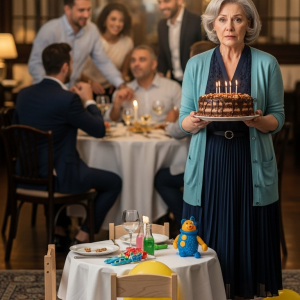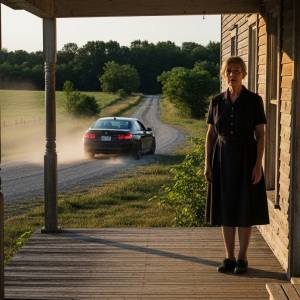My name is Nora Franklin. I thought I had seen the worst life had to offer when I buried my husband, but I was wrong. The worst was yet to come, and it would be delivered by my own son.
The house in Westchester County had been my prison for two years. A sprawling colonial that once belonged to my late husband’s family, it was now occupied by my eldest son, Andrew, and his wife, Matilda.
They moved in after Gerald died, claiming they needed to help me through the “transition.” What they really needed was free childcare for their twin boys and someone to maintain their lavish lifestyle while they climbed their respective corporate ladders.
The signs were there, had I chosen to see them. The way Matilda introduced me as “Andrew’s mother, who lives with us,” never mentioning this was, in fact, my house. The way Andrew would ask me to tidy up before his colleagues arrived, as if I were staff.
But I stayed. I stayed because I believed family meant something, because I clung to the fantasy that my children would eventually recognize my sacrifices. I was mistaken.
The morning of Andrew’s thirty-second birthday dawned gray and cold, a perfect match for my mood. I’d been up since 5:00 a.m. preparing for his party—homemade lasagna, garlic bread, a chocolate cake from scratch.
“Mom, don’t forget the house needs to look perfect,” Andrew said over coffee, his eyes glued to his phone. “Mr. Harrison is coming. This could make or break my promotion.”
“Of course, sweetheart,” I said, swallowing the bitter taste in my mouth. “Everything will be ready.”
Matilda swept into the kitchen, already in a designer dress. “Nora, I’ve laid out cleaning supplies. The baseboards are dusty. Oh, and please be discreet tonight. Andrew’s colleagues don’t need to know about our… living situation.”
Discreet. As if my presence in my own home was a source of shame. I spent the day cleaning and cooking, preparing for a party to which I was not truly invited.
By 6:00 p.m., the house gleamed. Crystal glasses caught the light. The dining table, set with my grandmother’s china, looked like something from a magazine.
The guests began arriving around seven. I watched from the kitchen as expensive cars filled the drive, disgorging men in tailored suits and women dripping with jewelry. These were Andrew’s people now.
I remained in the kitchen, plating appetizers that Matilda would carry out as if she’d prepared them herself. Through the serving window, I could see Andrew holding court, looking so much like his father before life and liquor wore him down.
Around 9:00 p.m., a man I didn’t recognize approached the kitchen. He was older, perhaps in his late sixties, with kind eyes and the quiet authority of someone accustomed to being listened to.
“Excuse me,” he said, his voice warm. “I’m looking for the restroom.”
“Down the hall, second door on the right,” I replied, not looking up from the dishes.
He didn’t move. “I have to say, this is exceptional food. Did Matilda make all of this herself?”
Something in his tone made me glance up. “No,” I said quietly. “I did.”
He nodded slowly. “I thought so. I’m Joseph Harrison, by the way.”
My hands stilled in the soapy water. This was Andrew’s boss. The senior partner. And I was meeting him in an apron, smelling of garlic and dish soap. “Nora Franklin,” I said, drying my hands. “Andrew’s mother.”
“Ah,” his expression grew thoughtful. “I see. Well, Mrs. Franklin, your cooking puts most restaurants to shame. Andrew is a lucky man.”
Before I could respond, Andrew’s voice boomed from the other room. Mr. Harrison gave me a knowing look. “It was lovely meeting you, Mrs. Franklin. I have a feeling we’ll speak again soon.”
It was nearly midnight when the last guest left. Matilda had already disappeared upstairs, leaving me to clean. Andrew lingered in the living room, pouring himself a large whiskey.
“Good party,” he said, not looking at me. “I think Mr. Harrison was impressed.”
He took a long sip of his drink. “You know, Mom, Matilda and I have been talking about the future.”
Something in his tone made me freeze. “What kind of plans?”
“Well, the boys are getting older. We won’t need as much help around the house. We’ve been thinking it might be time for you to find your own place. Start living your own life again.”
The words hit me like a physical blow. After everything I had sacrificed, they were planning to discard me. “This is my house, Andrew,” I said quietly.
“Actually, it’s not,” he said, his voice casual. “Dad left it to me in the will. You have a life estate, but that doesn’t mean you have to use it. We think it would be better if you found somewhere smaller. More manageable for someone your age.”
I stared at the stranger wearing my son’s face. The love I’d held for him, the hope I’d nurtured for years, began to crystallize into something harder, colder, and infinitely more dangerous.
“I see,” I said, my voice barely a whisper. He finally looked at me, and for a fleeting moment, I saw uncertainty in his eyes. He knew he had just crossed a line from which there was no return.
The next morning brought no apology. Andrew left for work, whistling. Matilda issued her daily orders for the children before leaving for brunch with friends. The conversation from the night before might as well have never happened.
That afternoon, I called my lawyer, Patricia. “Andrew claims the house belongs to him,” I explained.
There was a pause. “Nora, that’s not true. You have a life estate. He can’t force you out. He has no legal right to even suggest it.”
After I hung up, I felt a surge of something I hadn’t felt in years: power. Andrew had lied, trying to manipulate me into surrendering my home. If my son wanted to play a game, I was about to show him how a master plays.
Three days later, Matilda announced another dinner party, this one more exclusive. “We’ll need the full treatment,” she said, scrolling through her phone. “Something elegant, to show we have sophisticated taste.”
“Of course,” I said, my mind already working.
On the night of the party, I outdid myself. The table was a masterpiece of silver and crystal. The menu was ambitious: beef Wellington, a chocolate soufflé. I wore my best black dress and did my hair and makeup carefully. I would not be playing the part of the hired help tonight.
The guests arrived, including Joseph Harrison, who nodded at me with that same knowing look. I served cocktails, moving invisibly through conversations about stock tips and vacation plans.
“Andrew, you must give me the name of your caterer!” gushed Mrs. Wellington, another partner’s wife.
Andrew beamed, catching my eye with a wink, as if I were a co-conspirator in his lie. It was then that Mr. Harrison approached me.
“Mrs. Franklin,” he said quietly. “I have to ask. Are you by any chance the same Nora Franklin who used to run Franklin & Associates?”
The question struck me like lightning. The consulting firm I’d built from nothing, the business that had paid for this house, for Andrew’s entire life. “Yes,” I stammered. “That was a long time ago.”
“Not so long,” he said, his eyes sharp. “I remember when you sold to Brennan Corp. Brilliant exit. You walked away with what, thirty million?”
“Thirty-two million, actually,” I replied, the number hanging in the air. Money Andrew knew nothing about.
“I have to ask,” Harrison continued, “what are you doing serving drinks at your son’s dinner party?”
Before I could answer, Andrew appeared. “Mr. Harrison! Enjoying yourself?”
“Indeed,” Harrison replied. “I was just speaking with your mother about her former business.”
Andrew’s smile faltered. “Oh, Mom’s little consulting thing. That was ancient history.”
“Thirty-two million dollars isn’t ancient history, Andrew,” Harrison said quietly.
Andrew’s face went white. He turned to me, his expression a mixture of shock, confusion, and fear. For the first time, he was seeing me not as a faded woman who cleaned his house, but as someone with resources he’d never imagined.
I retreated to the kitchen, my hands steady. Through the serving window, I saw Andrew and Harrison in a hushed, intense conversation.
At dinner, the tension was palpable. As I refilled a wine glass, Mrs. Wellington called out, “Nora, dear, Joseph was telling us the most fascinating story. Didn’t you used to work in consulting?”
Before I could answer, Andrew’s voice, loud and flushed with wine, cut across the table. “Oh, Mom had a little business. Helping small companies. Nothing too sophisticated. She was always good with housework.”
The dismissal was so total that a silence fell over the table. But Andrew wasn’t finished. He seemed determined to put me back in my place.
“Actually,” he continued, his voice rising, “since we’re being so honest, I should clarify. Mom doesn’t live here in the traditional sense. We took her in after Dad died. She didn’t have anywhere else to go. It’s more of a caregiving situation.”
The silence that followed was deafening. Forks paused. Wine glasses froze.
“She helps around the house,” Andrew pressed on, drunk on his own arrogance. “Cooking, cleaning. We let her stay because, well, what else was she going to do? Think of her as our housekeeper. We let her stay out of pity. She’s good with a mop.”
The words landed like a physical slap. Several guests gasped. The men shifted uncomfortably.
Harrison set down his wine glass, his face a mask of controlled disgust. “Andrew,” he said quietly. “Are you absolutely certain that’s how you want to characterize your mother?”
“Of course! Look at her! Does she look like someone who built a multi-million dollar company?” Andrew laughed, a harsh, ugly sound.
Harrison’s expression shifted from disgust to something far more dangerous. He turned to the entire table. “Ladies and gentlemen, allow me to introduce you to Nora Franklin, founder and former CEO of Franklin & Associates. When she sold her company fifteen years ago, the purchase price was thirty-two million dollars.”
A wine glass tipped over, spilling red across the white tablecloth like a fresh wound.
“Mrs. Franklin,” Harrison continued, his eyes locked on Andrew’s horrified face, “revolutionized supply chain management, holds two patents for software still generating royalties, and has been featured on the cover of Forbes. But perhaps most relevant to tonight… Nora Franklin is worth approximately sixty-eight million dollars. Wealthy enough to buy and sell this law firm several times over.”
Matilda made a small, choked sound.
“Now, Andrew,” Harrison said, his voice deadly calm. “Would you like to reconsider your characterization of your mother as ‘domestic help’?”
Andrew stared at me, his eyes wide with panic. He was finally seeing me clearly—not as the broken woman he’d imagined, but as the force of nature who had built an empire while he was still learning to tie his shoes.
“Mom,” he whispered, his voice cracking.
I walked slowly around the table and stood directly behind his chair. “You want to know what pity looks like, Andrew?” I whispered, for his ears alone. “Pity is what I felt for you five minutes ago. But pity has its limits. And you just reached mine.”
I straightened up and addressed the table, my voice carrying the authority of a CEO. “Ladies and gentlemen, thank you for coming. I’m afraid dinner is over.”
After the last guest fled, the house was silent. Andrew and Matilda sat at the table like defendants awaiting their sentence.
“Mom, please,” Andrew finally broke the silence. “Let me explain.”
“Explain what?” I said, not looking at him as I cleared the crystal glasses. “Explain how you’ve been living off my generosity for two years while telling your friends I’m a charity case? Explain how you planned to steal my house by lying about my husband’s will?”
“Nora, you have to understand our position,” Matilda began. “Andrew’s career…”
“Let’s talk about Andrew’s career,” I said, finally turning to face them. “The career launched with my money. The law school tuition I paid. The country club membership that got him into his firm. Should I continue?”
I poured myself a glass of the expensive scotch they had been drinking so freely. “Here’s what is going to happen,” I said, settling into my late husband’s favorite armchair. “Tomorrow morning, you will begin looking for a new place to live. You have thirty days to move out.”
“You can’t do that!” Matilda cried. “This is our home!”
“This was never your home,” I stated calmly. “It is my home, which I generously allowed you to inhabit. That arrangement is now terminated.”
“Mom, my reputation!” Andrew pleaded. “My standing at the firm!”
“Your reputation?” I laughed, a sound as sharp as breaking glass. “Andrew, by morning, everyone at your firm will know what happened here tonight. Mr. Harrison is not a man who stays silent in the face of such a profound lack of character.”
The truth of it hit him. His career was already over.
“There has to be a way to fix this,” Matilda said, desperation in her voice.
“Let me make something very clear,” I said, my voice dropping to a deadly quiet. “I don’t forgive. I don’t forget. And I do not give second chances to people who mistake my kindness for weakness.”
I laid out the new reality. They would leave in thirty days. Andrew would resign before he was fired. They would receive no financial assistance from me. Ever again.
“But the boys,” Andrew pleaded. “They’re your grandchildren.”
“The boys you taught to see me as a servant?” I shook my head. “You made your choice about what kind of relationship they would have with me. Now you will live with the consequences.”
I stood up. “This conversation is over. You have thirty days.”
As I walked towards the stairs, Andrew made one last, desperate plea. “Mom, what if we apologize?”
I paused and turned back to look at the man who was once my son. I felt nothing. Not anger, not sadness. Just a cold, clinical assessment of a problem that had to be solved.
“Andrew,” I said quietly. “There are some betrayals that are too complete for redemption.”
I climbed the stairs to my bedroom—my bedroom, in my house—and for the first time in two years, I locked the door.
The next morning, I made three calls: to my lawyer, my financial advisor, and a private investigator. By the time Andrew and Matilda came downstairs, I was sitting at the kitchen table with a stack of documents.
“I had my investigator look into your finances,” I said, sliding a folder across the table. “Credit card statements, receipts. Over twenty-three thousand dollars in the last six months spent on luxuries, all charged to accounts I gave you for ‘household expenses.’ Fraud is such an ugly word, don’t you think?”
They stared at the papers, speechless.
“You will leave quietly,” I continued. “You will not contact the media. You will not use my grandchildren as emotional leverage. In return, I will not pursue legal action and send these documents to the bar association’s ethics committee.”
“And if we don’t agree?” Matilda whispered.
I smiled, a cold, unfamiliar expression. “Then you will discover exactly how ruthless a successful businesswoman can be when she decides to destroy someone.”
Three weeks later, I watched the moving truck pull away. The house felt clean again, the oppressive weight of resentment finally lifted. In Andrew’s former office, I found a letter from his firm. His position had been terminated, effective immediately. Perfect.
A month after they left, Matilda called, sobbing. “The boys are asking for you,” she cried. “They don’t understand. Andrew can’t find work. We’re struggling.”
“Actions have consequences, Matilda,” I replied calmly. “This is what consequences look like.” I hung up on her sobs and blocked their number.
Six months later, I ran into Mrs. Wellington at the grocery store. She rushed over, eager to invite me to join her charity committee. The same woman who had watched my public degradation now competed for my approval. “How thoughtful,” I said coolly. “I’ll have my assistant send a check.”
Driving home, I reflected on the completeness of my victory. I had my house, my dignity, and a reputation as a woman not to be crossed. I pulled into my driveway and looked at the house Gerald and I had built our lives in. The roses were blooming, their deep red petals catching the evening light like droplets of blood.
Beautiful and dangerous. Just like justice, served cold.




